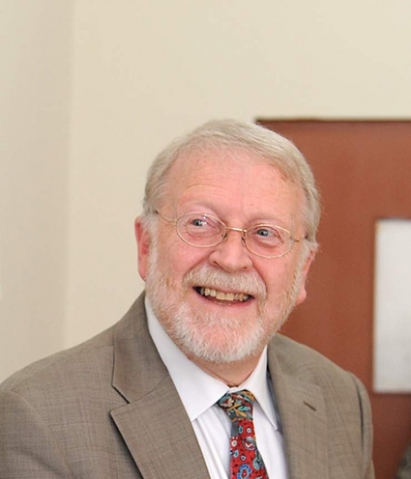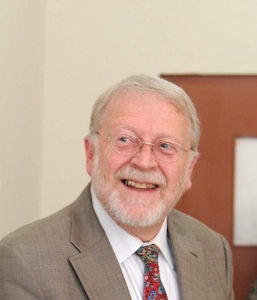New Legend of St George: The British Georgian School
The academic year has begun once again and your children are safely in the school of your choosing, hopefully being educated by top-notch, well-trained and motivated teachers and set for bright futures. Choosing the right school, especially if you are British with half-Georgian children, like me, can be something of a challenge. One school I’ve got my eye on for my daughter next year is the St George’s British-Georgian school (BGS). British and American-educated Dr Christopher Greenfield brings a wealth of knowledge and experience to the position of Headmaster-Advisor to BGS. Georgia Today met him to discuss the particulars.
Q: Christopher, how did you end up as Headmaster at BGS?
A: Stephen Nash, who served as the first British Ambassador to Georgia in 1995, made the link for me to come to St George’s British-Georgian School. He’d been helping the school since he served in Tbilisi, and arranged for me to meet most of the Board of Directors in London in 2012. I’d been given a good impression of Georgia by Georgian students I taught in the UK so was delighted to accept the offer of the headship starting in September 2013.
Q: Can you tell us a little about your background?
A: I’m British, educated at the universities of Leeds, Bristol and Cambridge in the UK and Michigan State in the USA. I taught in the UK, in an American school in Bahrain, and I administered a school in Lebanon. I then served as headmaster of two independent schools in the UK for 27 years until coming to Georgia three years ago. I was vice chairman, then chairman of the British Boarding Schools Association from 2009 to 2011, and I continue to help the British Independent Schools Inspectorate to monitor and maintain standards in British international Schools around the world.
Q: Tell us about BGS. Just how British is it?
A: BGS is authorised by the Georgian Ministry of Education, so there are many requirements laid upon us that mean we cannot be, nor do we want to be, an entirely British school. However, we are allowed to add value to our work of educating Georgian boys and girls by offering them the opportunity to gain qualifications that are recognised in the UK and around the world. A British approach to education runs throughout the school, prioritizing interactive, interesting lessons, and procedures that have proved valuable in British schools, such as emphasis on teachers’ professional development, involvement of students and teachers in decision-making, weekly assemblies with each section of the school, whole school projects such as our St George Day Fair, form periods with dedicated form teachers, and much more!
Q: What challenges did you face when you arrived at the school?
A: The biggest challenges at BGS were raising the standards of teaching and achievement throughout. The school had an excellent reputation for success on the Georgian side, and the British was also good, but there is always room for improvement. We achieved improvements by bringing in experts from the UK and elsewhere, and sending teachers to the UK, as well as making use of resources and experts available in Tbilisi. I also took a direct role in coaching and tutoring the teachers leading the British examination courses. Our results at GCSE this year were record breaking! At GCSE level we had 100% pass, but more importantly 88% of our passes were at the higher levels required in UK to move on to advanced level study. This compares with a higher-grade pass rate of less than 70% in England! I have congratulated the students and teachers involved in this record set of results for the school. Last year our higher grade passes were in line with the results in England, so to beat the results achieved by British boys and girls at the same age is outstanding! Our results at A level also improved from about 35% last year to 75% this. I am delighted with the progress the school has made.
Q: What can you say you have contributed to the school in your time there?
A: My British training and background has probably been my biggest contribution to BGS. I have introduced new disciplinary standards, new teacher development targets, a timetable based on the British model, giving students regular breaks during the day and a calendar that includes several short breaks during the school year. We now have new standards of punctuality and appearance for both students and staff... and many more innovations since September 2013!
Q: How well have the staff and students (and parents!) reacted and responded to your new standards?
A: Parents and students, as well as teachers, want an orderly but relaxed atmosphere where learning can be enjoyable. The new student detention system introduced last year has been accepted and is now rarely used - the reminder that a student might be heading for detention is usually enough! We have introduced a smarter new uniform, and provide plenty of breaks during the week to allow students to let off steam under gentle supervision. The greater emphasis on punctuality has seen almost all student (and teachers!) arriving on time to ensure the school makes full use of teaching time. Attendance has also improved greatly, indicating that parents and students appreciate the improvements at the school, which will include discipline.
Q: How would you describe the standard education system here in Georgia?
A: The Georgian system of school education is excellent at training students’ memories and emphasising the importance of factual recall. However, it does not seem to stimulate the interest or engagement of many students, possibly because it does not seem to require students to analyse material, suggest solutions, think critically or research the facts. There does not seem to be much scope for the original thinking or practice that will be necessary for Georgia to compete on equal terms with Western Europeans and Americans in the future.
Q: What makes BGS different?
A: We believe that BGS is unique. All Georgian students complete the Georgian curriculum, but in addition they can also take British International qualifications as well if they wish, in the same place at the same time, with no additional fee for tuition. The speciality of the school is English language development, which is outstanding. I can talk quite naturally in the English language to students in most grades at BGS, certainly from grade 5 up. The school also aims to keep fees affordable for Georgians.
Q: How would you describe the current infrastructure of the school? What are the school’s plans in this direction and how soon do you think these will be achieved?
A: BGS has a compact city centre site, near Heroes’ Square. On the campus we have an excellent range of educational and creative facilities, including a science laboratory, library, computers, projectors and smart boards, as well as classrooms and an assembly hall, on three floors. We also have a dining room and doctor’s room in our building. Outside in the school playground we have a basketball court and stadium, an outdoor classroom, and other play equipment. Off campus we use the Tbilisi Arena for swimming and sporting activities. We have added some of these facilities over the last two years, and have plans to add more technological equipment to the school and more play equipment, especially for younger children, in the playground. The school is maintained to a very high standard, and every summer a substantial renovation and improvement programme takes place.
Q: What would you like to see in the future for BGS?
A: I would like to see BGS widely recognised as a model of pedagogical and academic excellence in Georgia, working in friendly partnership with others. I hope that dozens of young Georgian men and women will be using BGS to gain the qualifications they need to study in English at universities around the Western world, bringing home the skills that Georgia needs for its essential future development.
Katie Ruth Davies












